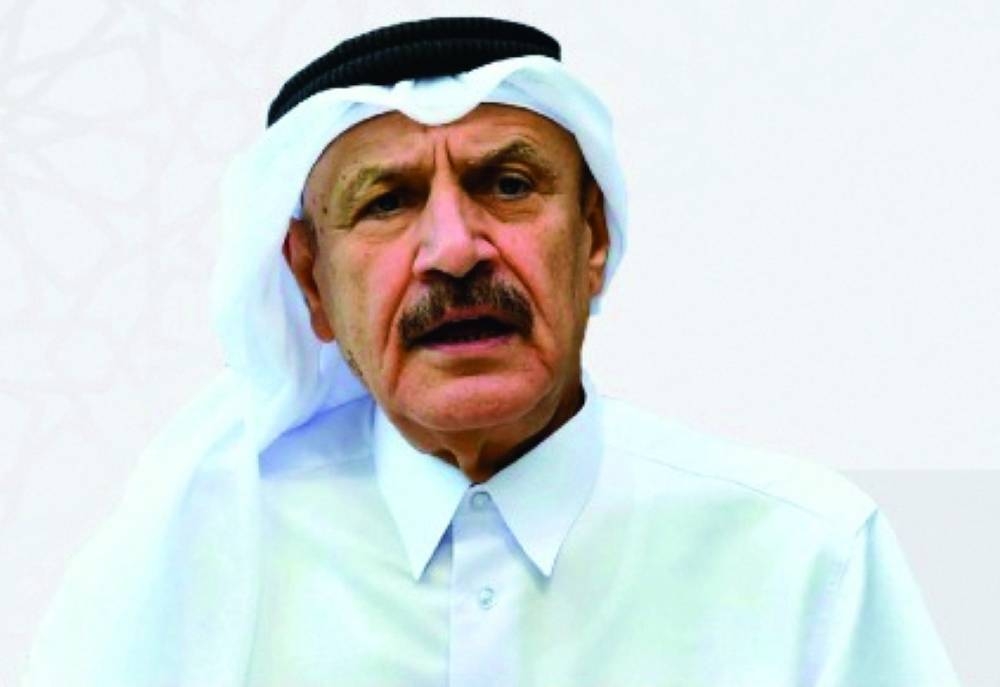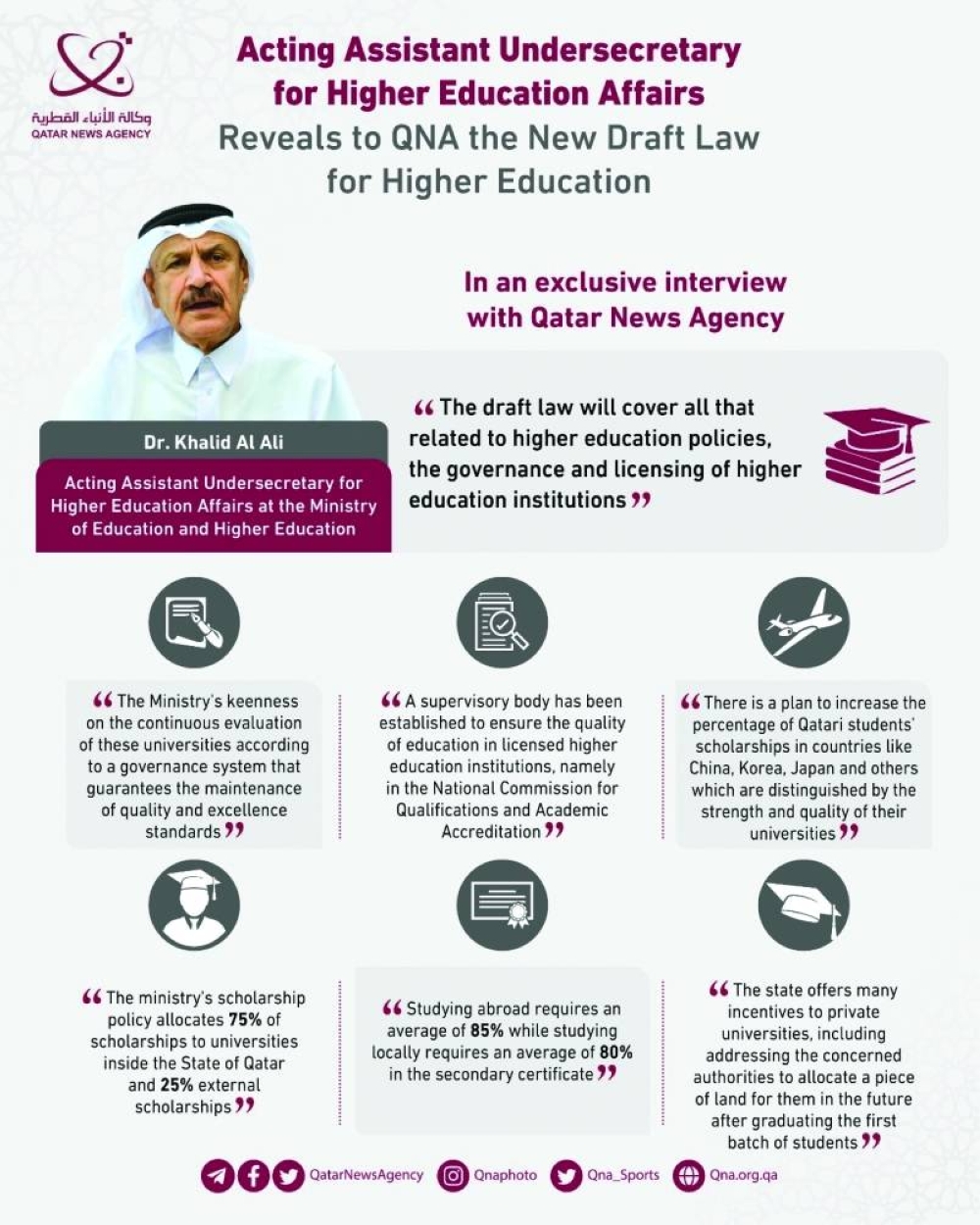- MoEHE reviewing noted Malaysian research university's request to open branch in Qatar
In an exclusive interview with Qatar News Agency (QNA), Dr al-Ali noted that the draft law will cover all issues related to higher education policies, the governance and licensing of higher education institutions as well as their oversight, programmes and statistics so that the MoEHE assumes the responsibility of general supervision and serves as a general umbrella for higher educational institutions while preserving the independence of universities through their boards of directors, which usually include a representative of the ministry.
Referring to the significant expansion witnessed by the State in the establishment of higher education institutions, which have now reached 34 governmental, semi-governmental, private and security and military educational institutions, with more than 40,000 students, he stressed the MoEHE's keenness on the continuous evaluation of these universities according to a governance system that guarantees the maintenance of quality and excellence standards.
From this standpoint, Law No. 31 of 2020 was issued to establish the National Commission for Qualifications and Academic Accreditation, which is a committee separate from the ministry's licensing body and carries out governance and review of the work of universities after their opening and operation to ensure the quality of their educational programmes.
He pointed out that the Covid-19 pandemic demonstrated how communication between the ministry and the universities is close in terms of co-ordination regarding the study pattern and the application of safety measures and everything related to that during the pandemic.
He noted that the ceiling for admission requirements for any educational institution wishing to open a branch in Qatar has been raised, to be among the best 300 universities in the world, according to the international assessment of universities. In this regard, he referred to the existence of three international rankings, which are The Times Higher Education World University Rankings, the QS classification and the Shanghai Jiao Tong classification.
Any university that meets the criteria of being among the best 300 universities in the three aforementioned rankings has the right to apply to open a branch in Qatar often with a Qatari partner or investor, provided that it uses the same programmes applied in the mother university, and offers the same certificates and same conditions when accepting students, he said.
He pointed out that one of the distinguished Malaysian research universities has requested to open a branch in Doha, and the ministry is currently reviewing the fulfillment of all the requirements for its establishment, expecting that it may open next October.
He added that there were several requests from more than one university from different countries, but only one university was able to complete the necessary procedures and requirements to start operation in the next academic year.
A supervisory body has been established to ensure the quality of education in licensed higher education institutions, namely the National Commission for Qualifications and Academic Accreditation, which has a number of experts and specialists, he said. This was one of the challenges that faced higher education in the past, but with the issuance of the law, framing the committee's work has begun to ensure the quality of its outputs in the higher education sector.
Pointing to the challenge facing some Qatari students wishing to study in universities without prior approvals from the ministry, he stressed that the MoEHE continues to raise students' awareness of the need to obtain prior approvals to study at their own expense in universities outside the country.
Another challenge is related to collecting data on universities and students in higher education institutions, he noted.
In his interview, Dr al-Ali revealed that the ministry's scholarship policy allocates 75% of scholarships to universities inside Qatar and 25% external scholarships, noting that about 3,000 Qatari students on scholarship are studying in various universities within and outside Qatar, and 75% of them are female.
The official said the ministry is currently building a database for all higher education students both within and outside Qatar, while also highlighting a database of students on scholarship through the ministry that it is currently working to list all scholarships through other agencies and institutions in the country and students studying at their own expense.
Regarding certificate equivalency, he said there are two systems. One of these is 'certificate equivalency', which means making sure that the certificate meets the standards used in Qatar, allowing its holder to complete studies or work, while the other system is about certifying for work only for non-Qataris.
Dr al-Ali explained that certificate authentication means studying the certificate and making sure that it is issued by a distinguished and accredited university, free of forgery, and submitting it to the employer that has the final decision to approve the holder of the certificate to work for it, noting that this procedure is followed with regard to employment in the private sector, especially in simple jobs that may not require advanced skills.
Tuition fees in private universities vary from one university to another, but the ministry ensures that the fees do not exceed the fees of the original university, he said, noting -at the same time- that some universities offer scholarships to Qatari and non-Qatari students according to their grades, and others after the student passes one year or two years with distinction at the university.
He also pointed out that the State offers many incentives to private universities, including addressing the authorities concerned to allocate a piece of land for them in the future after graduating the first batch of students to build a permanent campus for them. He affirmed that the ministry is working closely with these universities to solve all the problems and obstacles they face, and some universities have started the process of building their permanent headquarters.
Complaints raised by some private university students with the ministry are referred back to universities for resolution, and each university has its own mechanism to deal with these issues through committees formed for this purpose, he said, pointing out that this is the pattern followed in various universities of the world.
He underscored the MoEHE's keenness to adopt well-considered policies with regard to higher education based on Gulf, Arab and international data, experiences and expertise.
The ministry is keen to adopt carefully studied policies, and it tries to identify what is in force in the Gulf, the Arab world and internationally, after which it presents what is appropriate for Qatar and what is in line with its reality and responds to its aspirations and plans in higher education, he added.
He also said there are Gulf mechanisms through which experiences and expertise are exchanged, including the Gulf Network for Quality Assurance in Higher Education (GCC), which is concerned with studying the quality of higher education in the Gulf countries, and discussing the experiences of GCC universities.
He highlighted the close co-operation among the GCC countries in the field of higher education, where all issues related to it are reviewed and consulted on, while benefiting from each other's experiences, in accordance with the specificity of each country and its laws that regulate the educational process.
The next strategy for Qatar focuses on creating new jobs for the country's future, he said, adding that significant shifts in the labour market and in the jobs required for the next few decades are expected to be witnessed.
He pointed out that the current focus is on technological disciplines such as computer science, software, artificial intelligence (AI) and cybersecurity, indicating that the last two disciplines are important for the future, especially AI, which is expected to be required in various sectors.
Dr al-Ali emphasised that the MoEHE realises the size of challenges in the type of jobs required in the future and works hard to create a generation that is aware of this challenge and understands the future needs of the labour market.
He noted that the ministry is currently working in co-operation with the Civil Service and Government Development Bureau to launch academic advising programmes for students in public schools from the ninth grade in order to know their inclinations and scientific orientation, so that they can be directed to the specialisation that does justice to their abilities and talent.
Dr al-Ali called on the students to be serious and diligent in seeking knowledge, urging scholarship students to be the best ambassadors for their country and homeland and to reflect in their behaviour the morals and values of the Qatari people in terms of commitment, tolerance and respect for others.


